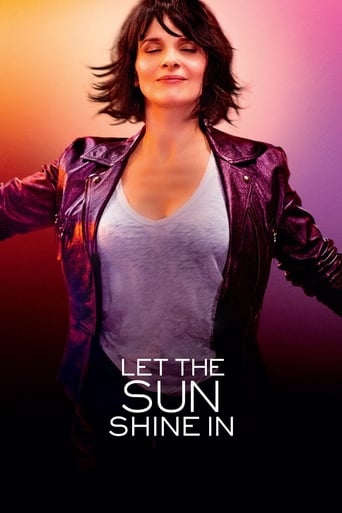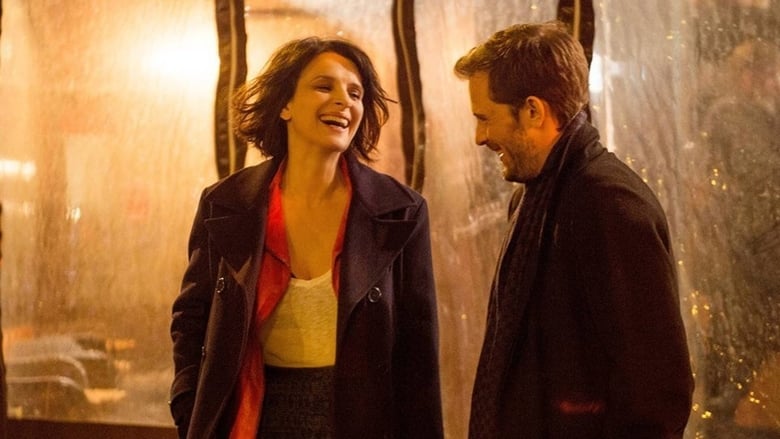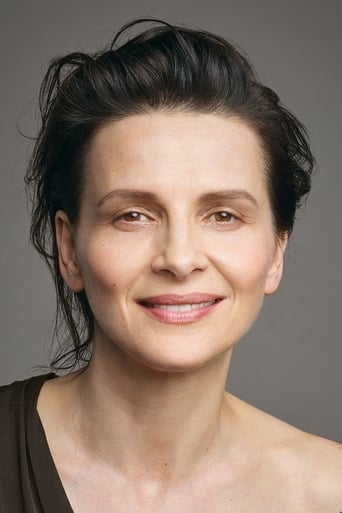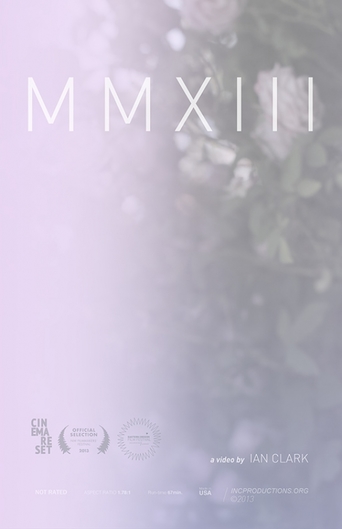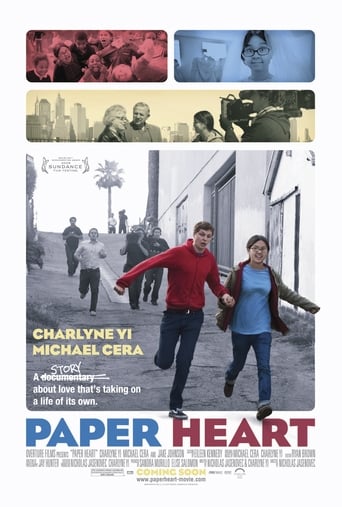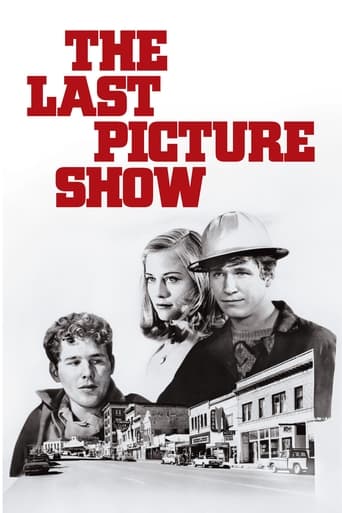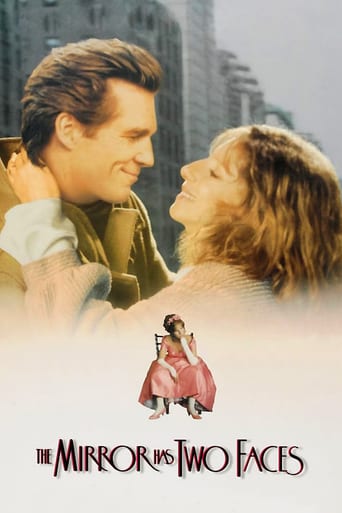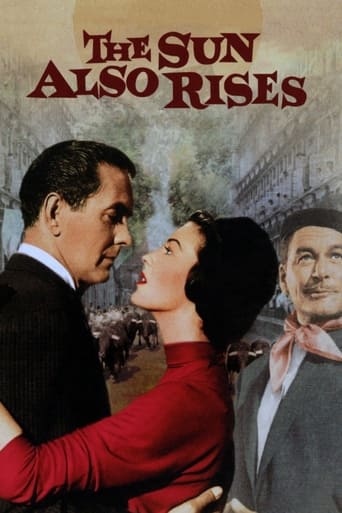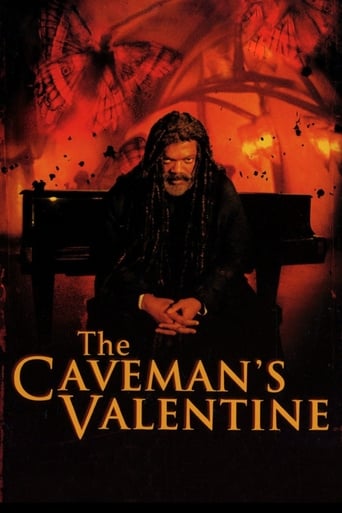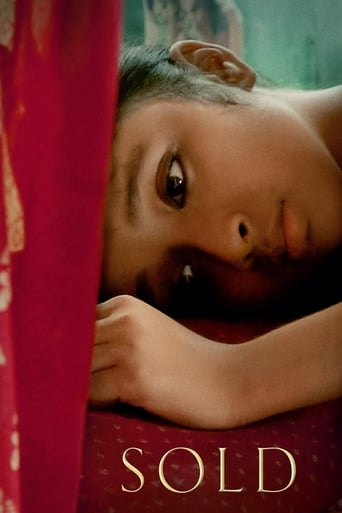Let the Sunshine In (2018)
Isabelle, Parisian artist, divorced mother, is looking for love, true love, at last.
Watch Trailer
Free Trial Channels
Cast


Similar titles
Reviews
Surprisingly incoherent and boring
Your blood may run cold, but you now find yourself pinioned to the story.
It is neither dumb nor smart enough to be fun, and spends way too much time with its boring human characters.
The movie's not perfect, but it sticks the landing of its message. It was engaging - thrilling at times - and I personally thought it was a great time.
By now we expect a Clare Dennis movie to be a stylish, incisive anatomy of French cultural or political traditions (aka cliches). Here she deploys romance queen Juliette Binoche as a passionate beauty moving relentlessly through a series of unfulfilling affairs. Isabelle is a successful painter, specifically an abstract expressionist. In the one work we see she splashes broad black strokes across a floored white canvas, hoping her sweeping slashes will discover and express a passion she has nowhere - or no-one - else for it to go. She seeks in that formless chaos a meaning and beauty in revolt against traditional orderliness. But we see her painting only once. So she seems to be playing at the role of the romantic artist - and in an obsolete genre at that. That's in love as in her art. In her search for someone in whom to invest her ardor she chooses poorly - the selfish, insulting married banker, the equally shallow married actor, the comically silent and vulpine labourer she meets in a dance. Her conversations are a cover under which she hides, hoping to pounce on the one physical connection that will sustain and absolve her. At first Isabelle easily commands our sympathy, our identification. But the sequence of her brittle affairs steadily shifts her from model to warning. As she moves through the variously unappealing men, as we watch her emotional rollercoaster, we see her as a compulsive dependent, whose modern sexual freedom only restricts self-discovery or lasting satisfaction. She proves a selfish mother, a difficult ex-wife, and variously unsupportive or unfaithful to her lovers, all under the cover of her own needs and special sensitivity. As her every sexual conquest only deepens her isolation, Isabelle's whole society is a satire of modern French culture. The genial but foppish neighborhood suitor who invites her to the country only provokes her explosion at bourgeois complacency, especially as it romanticizes their Nature. But from her attack on that cliche she only moves on to act one out herself-picking up the labourer at the bar. Isabelle's romances here form a critique of French romantic indulgence, especially in its cinema, which has long cornered the world market on free love. Hence the climactic appearance of French icon Gerard Depardieu at the end. In his first scene he appears - at first unidentifiable - with an unfamiliar woman on a date. He dismisses her. That is, he replays Isabelle's hunger for a romantic connection, futilely searching for completion in yet another stranger. In the next scene he's revealed as Isabelle's ostensible therapist - but he's a psychic! As he spews his intuitions about her various men she brightens in hope. But he's only picking up on her responses to deliver what she wants to hear. Long the bad boy of French romantic cinema, here the bloated charlatan spews pop psych cliches that only re-enforce her deluded quest for romantic perfection. Hence his urge that she be - not "ouverte" but the American pop - "open" to whatever temptation arises. That's not admitting the sunshine she craves, but reinforcing her darkness. While the credits scroll down the left side of the screen, Depardieu continues the shallow "insight" she needs to continue her pathetic delusions. His running on and on confirms the satiric function of his presence. Denis provides a rather negative range of characters here. Two men stand apart, the gallery colleague and friend who patiently waits her to return his love and the black man wise enough to insist on taking time to see whether a relationship will naturally develop between them. For a full, healthy relationship we only have Isabelle's friend's report that she and her Jacques are taking the time and trouble to work patiently on a demanding and therefore rewarding connection over time. Without the artist's license, they've moved from nomad to gardener.
The French film Un beau soleil intérieur (2017) was shown in the U.S. with the title Let the Sunshine In. It was co-written and directed by Claire Denis.Juliette Binoche portrays Isabelle, who is an artist. Isabelle is looking for love, but also looking for sex. In fact, she tells a friend that the only way she can climax when making love with one man is to think to herself, "He's a bastard." (Which he is.) Why would she stay with this man? She's looking for love in all the wrong places. That's the problem with the film, and probably why it has a terrible IMDb rating of 6.2. I might have given it a rating of 6 or 7, but Binoche is such a great actor that she earns the movie an additional point. Even if you think Juliette is foolish and misguided, Binoche makes you believe that she is that woman. You can decry her mistakes, but you can't dislike the portrayal. (Of course, it doesn't hurt that Binoche is so elegant and beautiful.)So, if you don't think you'd like a movie about a neurotic French artist, stay away. If you want to see what great acting looks like, see Un beau soleil intérieur.P.S. There's a long article about director Claire Denis in the May 28th issue of The New Yorker. However, the interviewer concentrated on Denis' next film, not this one.P.P.S. Can you recognize the old, overweight clairvoyant who appears at the end of the movie?
I don't think the people giving this a 1/10 went into this with realistic expectations. This is French cinema, it's going to be sad and harsh and difficult and the character likely won't come to a concrete and obvious realization leading to her happiness. This movie does not hold your hand, but it is well worth it for those willing to look deeper into their emotional history to see what it is reaching for. There are some conversations that don't land but a lot do because Juliette Binoche gives a stellar performance. This is the type of character study that most actresses wait their whole life to do, she's a volcano of emotions bubbling under the surface for the whole runtime. Her character is probably a "bad person". She dates several married men, but that does not invalidate her problems. This movie is about the idea that chasing perfection can often lead you down the wrong path in your relationships and lead to a fear of commitment. For anyone who finds it difficult to be swept off your feet and easily believe in the rest of your life with someone, this is the movie for you. If you think the title of the film is a task that is easy to achieve, maybe it isn't.
Despite the overwhelming positive critical response, there were a few critics who took French director Claire Denis to task for Let the Sunshine In, in French "Un beau soleil interior," best translated into English as "a beautiful sun inside." Written with co-writer Christine Angot, "Sunshine" stars the iconic Juliette Binoche as Isabelle, a divorced abstract painter who can best be described as "love-starved." A few female critics were angry that Denis depicts Isabelle as a woman who defines herself solely through her relationships with men. That wouldn't be so bad if the men depicted were an interesting lot-unfortunately they are not. What's more, Isabelle's back story is gravely lacking-we find out little about her professional life as a painter as well as the nature of her relationship with a 10 year old daughter (whom we meet only very briefly mid-narrative). Perhaps the most worthless review of Let the Sunshine In is the highest rated on Metacritic (a 100)-by Justin Chang writing in the LA Times who terms "Let the Sunshine In" a "sublime comedy of sexual indecision." He's right about Isabelle's sexual indecisiveness-but where is the comedy? Clearly Denis treats her beleaguered protagonist with kid gloves-she's really the woman with the "beautiful sun inside." She might be a "glutton for punishment," but in the end it's really the men who are at fault here (and a sad bunch they are indeed!). Perhaps potentially the most interesting man that Isabelle tries to hook up with is an oily banker whom we meet first (in the opening scene they're having a rather unsatisfactory sexual encounter). The banker's crime is that he wants an intimate relationship but will not give up his relationship with a wife to whom he's been married for many years. Denis unfortunately is loathe to build any suspense in her inert plot, so our frustrated banker makes a lame attempt at the art of stalking by plying Isabelle with a bouquet of flowers. He's unceremoniously given the boot by our lovesick protagonist and that's the last we hear of him. The rest of the Isabelle's potential suitors need little more description. They include an actor, Isabelle's ex-husband, a working class schlub and an art curator. Unlike the arrogant banker, their shortcomings amount to a coterie of dating misdemeanors: they're basically all a bland bunch and simply unable to commit. Finally Isabelle decides to go to a "professional" for advice after so many failed attempts at love. He turns out to be as bad as Isabelle's aforementioned love objects. It's Gerard Depardieu as a "medium," whose generalized "psychic" predictions prove as lame as their source-another abject mediocrity who believes in his own BS. Like the entire prior narrative, the medium goes on and on as the credits roll. Is Claire also mocking Isabelle for her gullibility? If she is, it's gentle mockery as it's already been established that the men here are the "butt" of the over-extended joke. Perhaps Denis can be forgiven for her feminist bias and her gentle ribbing of the male sex-but her main shortcoming here is an aesthetic one. Despite a good deal of smart, sophisticated dialogue and Juliette Binoche's performance (infused with verisimilitude), it's Denis' inability to build suspense and present a protagonist with an internal arc that displays a modicum of change.

